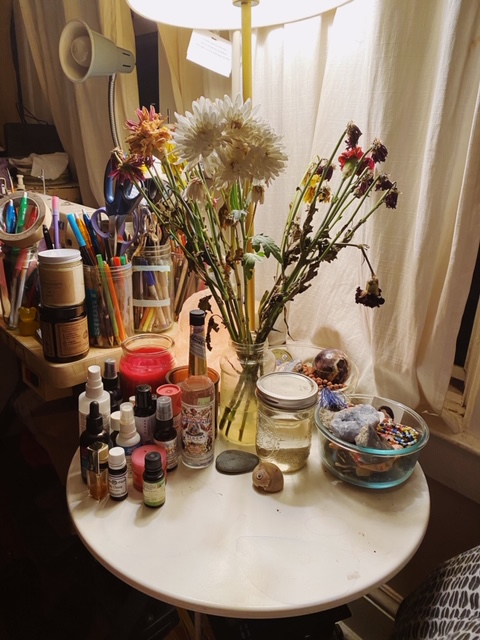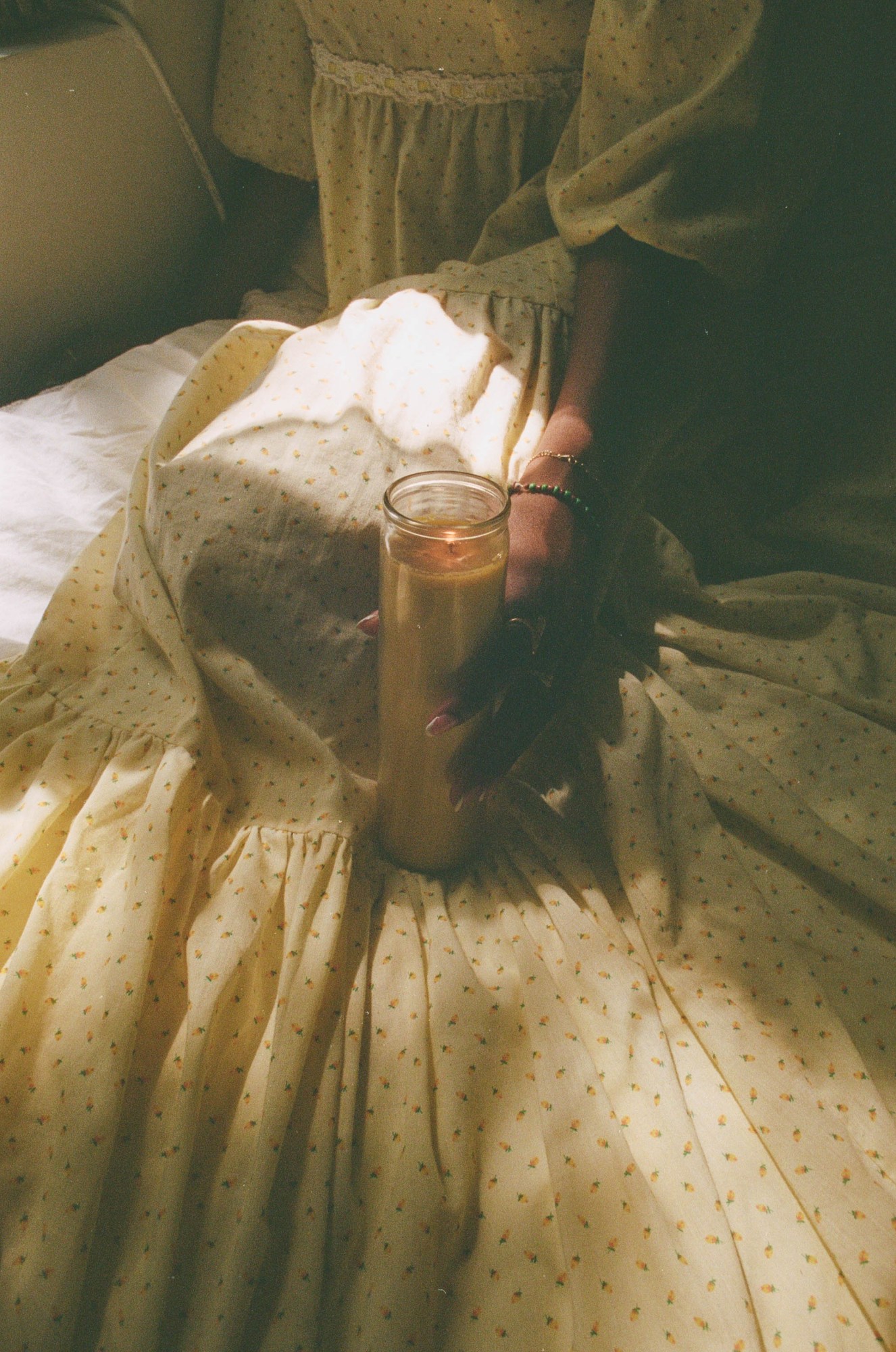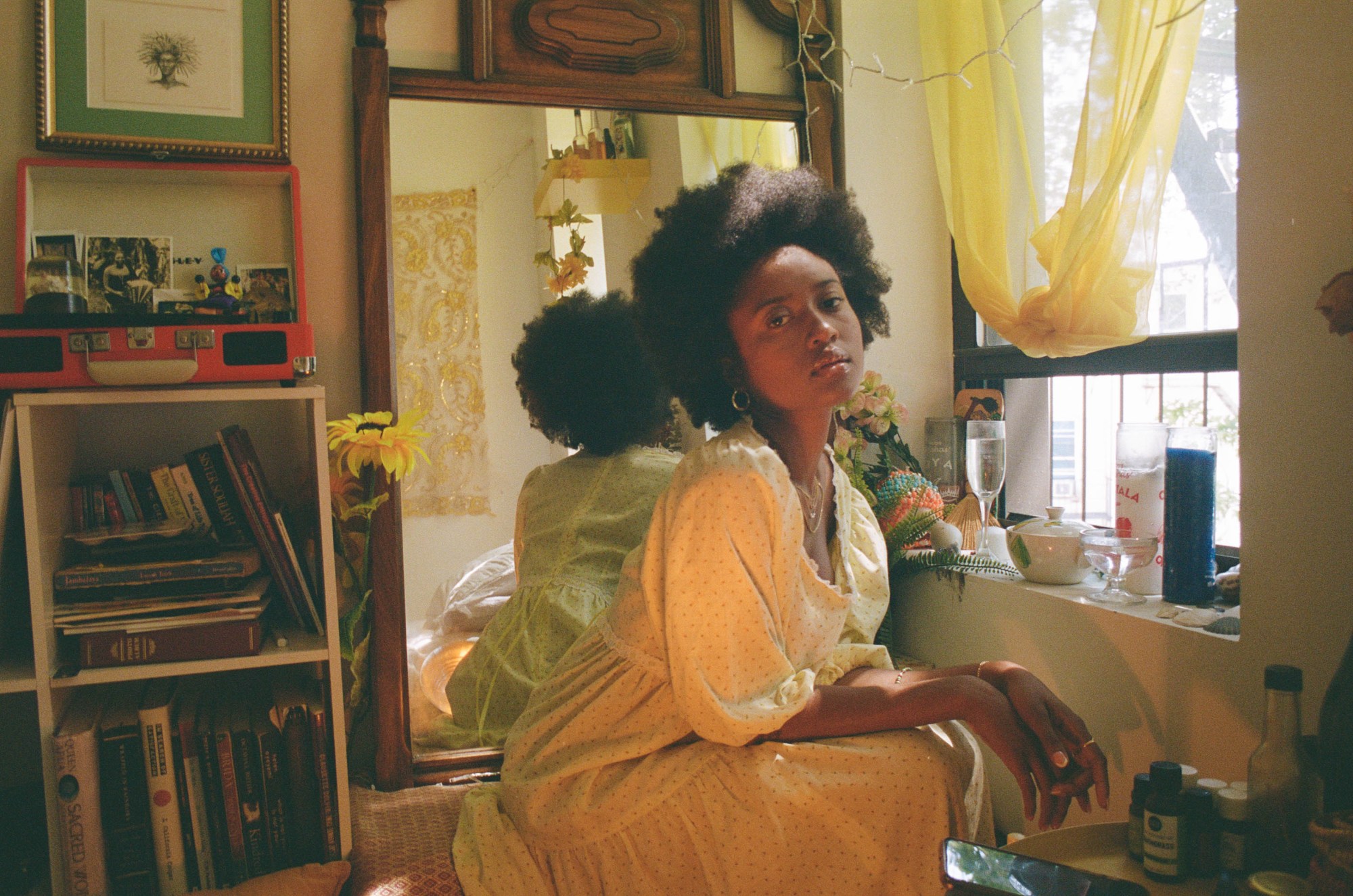Photographer and diviner Porsche Little tried her first spell at age 15 and, she says, it worked. At Christmas a few years later her sister gifted her a tarot deck and every time she pulled a card for someone, she was told that she was right. From there, she knew that she was onto something and had spiritual gifts that were later confirmed by a medium, who shared a message from one of her spirit guides — she should be charging for her readings.
Since then, Porsche has further explored her spiritual abilities and offers tarot readings, which can be booked via Instagram. She’s also a creative, working as a freelance photographer and founding editor of Drunk Magazine, an online platform curated by and for people of colour.
Porsche’s creativity and her gift of divination, she says, are interconnected. “I’m currently trying to balance the lifestyle of being a healer and diviner and also trying to make space for me to create,” Porsche tells i-D. While photography is something she fell into accidentally, after signing up for her classes last minute one semester, she realised she had a knack for fashion photography and styling.
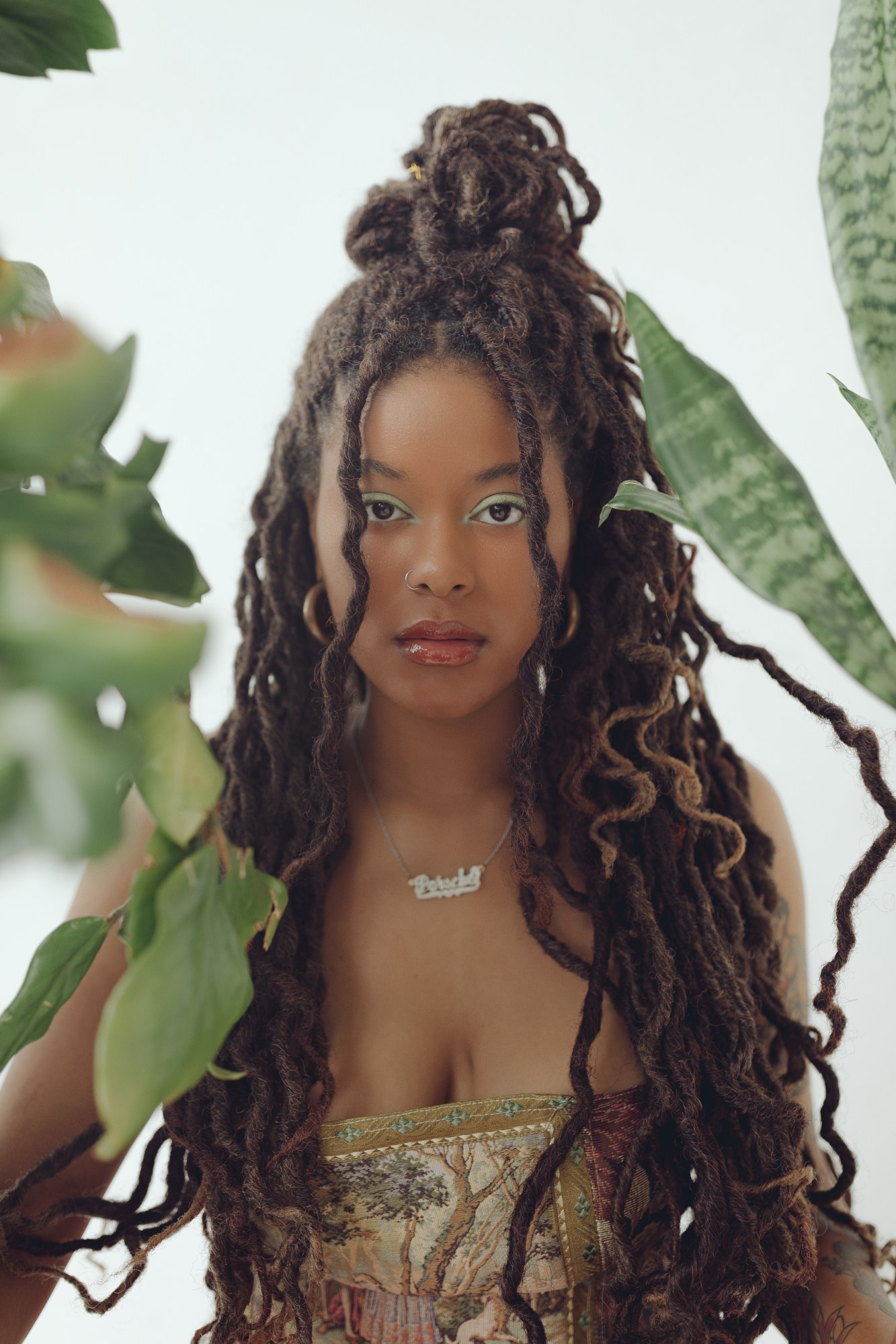
However, Porsche has “never felt more called to anything else in life,” than her spiritual work. Currently training to become a priestess — something she defines as “someone who spends their life doing the work for not only their god, their ancestors, but for themselves” — Porsche is researching and studying as much as possible, so that she can continue to help others find their rightful path. The process of becoming a priestess, she says, involves finding a mentor — a Santero, a priestess or a Babalawo — and learning everything you can from them.
She believes that being a witch allows her to approach things from a different angle creatively. “The Moon isn’t just ‘the Moon’ to me. I can look at her and know when I should be releasing something, when I should be starting a new project or when I should be manifesting,” she says. This, Porsche says, can bring its own unique set of challenges. “It’s hard because you never know when someone needs you, and there’s been times when I had to put aside editorials that I needed to edit, or videos I needed to upload, to attend to witch duties.”
As an Aborisha (someone who serves the Orishas, a group of spirits central to the Yoruba and other African Diaspora religions) and child of Esu Elegba, Porsche wants to encourage others to question what they’ve been told to think about Santería, an African diasporic religion that’s often considered “dark”. “As an African American, it is a privilege for me to say that I know where I came from, I know who walks with me, I know who protects me, I know who is guiding me, I know who was sent to me,” she says. “There is nothing evil about tapping into your own personal power, gaining a new sense of identity and honouring the ones who walked before you.”
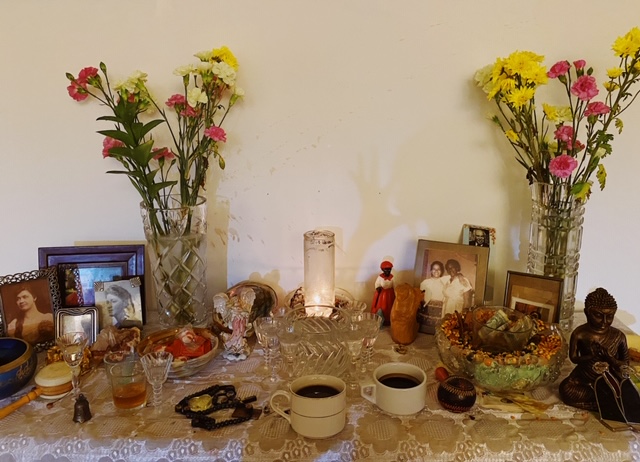
Porsche also wants other future priestesses and witches to know that they don’t have to drop everything else when they hear their spiritual calling. “It’s okay to be magical in your own way. If priesthood calls you and [you] want to be a singer, then girl, do both. Balance,” she says. Porsche points to other witches working in the fashion industry who’ve made it all work, one of which is Bria Scott, a diviner, model and freelance fashion designer with work spanning from Carlton Yaito x Tommy Hilfiger to Nike.
Bria’s entire family works in the spiritual realm. The designer grew up as a Quaker in New York, and after being invited to a spiritual gathering, her Mom was initiated into Ifa (a traditional Yoruba religion and divination system originally from Nigeria). At the same gathering, they found out that she and her siblings were called to priesthood as well. Bria is currently working to become an Iyanifa, or “Mother of the mysteries of Ifa” priestess, because she’s always wanted to help her community in a meaningful way. The process of becoming one, she says, is sacred and can’t be spoken about in detail.
For Bria, magic and art are “two sides of the same coin”. “What some may call inspiration, to me, is very much divine,” she says. “Ideas are a living thing that choose hosts with which to manifest, and if you find you aren’t up to the task, those ideas will certainly find their place in the world.”
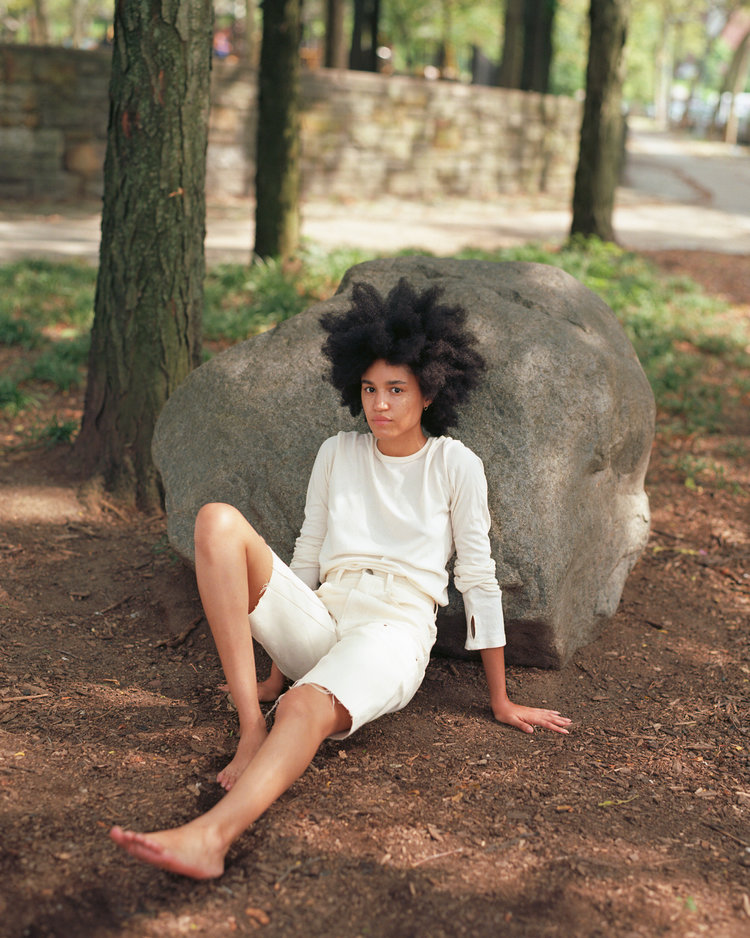
Bria remembers being creative from an early age, cutting up pillowcases with her Grandma or Mom to make outfits for her dolls by hand. Her connection to her ancestors, Bria says, keeps her balanced and focused on doing her best for her family and community at large. This is something she finds difficult in the fashion world where, Bria says, the work environment is often a toxic space with terrible company culture, or practices that don’t leave room for magic, art or her own personal experiences.
“We always have to make sure the wellbeing of humans is at the centre of all work,” Bria says, “but some places have valued products over people and that’s where magic goes to die.”
For Akua Shabaka, co-founder and creative director of House of Aama, fashion was a way to explore her identity and find comfort in environments that she felt excluded from. Her brand, founded with her mother Rebecca Henry while Akua was in high school, celebrates the Black experience by designing timeless garments with nostalgic references, informed by historical research, archival analysis and storytelling.
Working with her mom and focusing on their familial lineage, Akua says, has brought them closer. “We focus on the folkways of the Black experience, specifically the Southern United States and Diaspora as a way to research how Black people used their identity as a form of resilience,” she says. “We are intrigued by the symbolism of rootworkers [healers or practitioners of Hoodoo, the African American folk magic], Blues men or Southern belles in the Americana narrative.”

Akua comes from “a long line of women rootworkers” from South Carolina and Louisiana, and has always had a feeling that she was in tune with the divine. She grew up watching her mother lead women in spiritual circles for ancestral remembrance and healing, and her father, as an African djembe drummer, centred his spirituality around traditional ceremonies of drum and dance.
Akua uses Hoodoo practices and passed down folklore to navigate her everyday — personally and as a designer — whether it’s eating specific foods on certain holidays or working with the phases of the moon to invoke different energies. “Hoodoo is a spiritual practice formed under the ancestral retention and resistance of African slaves in the South,” she says. “It is a mix of African religions, esoteric knowledge, herbalism and Christianity (as a tool to keep practices secret and a road map for conjuring).”
Akua also practices tarot divination and uses herbs within her candle magic and petitioning to communicate with her ancestors. With her work in fashion focusing on her family heritage, spirituality and rootwork, Akua feels like magic only aids her creative expression. “It allows me to dig deeper into the occult and use it as a form of guidance,” she says. “I feel that in many ways, spirituality and magic are natural art forms that choose us.”
While Porsche, Bria and Akua’s creative work differs, they share a similar hope that people will acknowledge that their practices are not taboo, but beautiful traditions passed down for centuries. As for the fashion industry, which has long exploited Black people, it’s important we decolonise notions around magic and embrace spiritual creatives — particularly Black creatives and practitioners of African and Black Diaspora traditions — because it’s clear that among priestesses, magic and creativity are intertwined.
